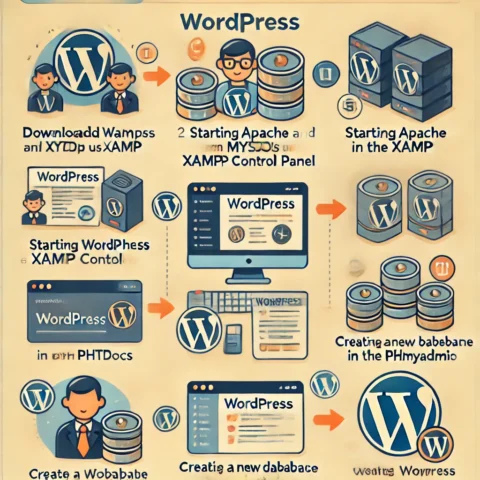A business’s online reputation can determine its success or failure. With instant access to reviews, feedback, and social media comments, consumers form opinions faster than ever. This makes Online Reputation Management (ORM) essential. Ignoring your online presence is no longer an option—proactively managing it can safeguard and enhance your brand’s image, foster customer trust, and drive business growth. In this blog, we’ll discuss why ORM is vital for your business and share practical strategies to master it.
What is Online Reputation Management (ORM)?
Online Reputation Management involves monitoring, influencing, and managing how your business is perceived online. ORM encompasses strategies to suppress negative content, highlight positive feedback, and engage meaningfully with customers to maintain a strong brand image. It combines aspects of SEO, content marketing, public relations, and social media management to create a well-rounded approach to maintaining your business’s reputation.
Why ORM is Crucial for Your Business
1. First Impressions Matter
Research shows that over 90% of consumers read online reviews before visiting a business. The first impression a potential customer gets from your brand online can heavily influence their decision. Negative reviews or bad press on Google, Yelp, or social media can drive potential clients away. Effective ORM helps ensure that the first impression your business makes is positive and credible.
2. Builds Trust and Credibility
Trust is the cornerstone of any successful business. A strong online reputation builds credibility and shows that your business is reliable and customer-centric. Responding to reviews, both positive and negative, and addressing issues publicly demonstrate that you care about your customers. This transparency goes a long way in building loyalty and trust.
3. Increases Sales and Revenue
Positive reviews and a strong online reputation directly impact purchasing decisions. Studies reveal that businesses with a rating of 4 stars or higher are more likely to attract customers than those with lower ratings. ORM helps ensure that potential customers see your best side, increasing conversions and, ultimately, revenue.
4. Mitigates Negative Publicity
In the digital world, news spreads rapidly. One negative story or bad review can spiral out of control and harm your business significantly. ORM strategies help you quickly identify negative feedback and address it before it damages your brand’s reputation. Swift action can minimize the impact of negative publicity and even turn it into an opportunity to show responsiveness.
5. Attracts Talent and Investors
A positive online reputation isn’t just for customers; it also attracts top talent and potential investors. Job seekers research company culture and reviews before applying. Investors, too, want to see that a business has a strong brand reputation and satisfied customers. Mastering ORM helps position your business as a reputable and attractive option for stakeholders.
How to Master Online Reputation Management
1. Monitor Your Online Presence
To manage your reputation, you first need to know what people are saying about your business. Set up Google Alerts for your brand name, products, and key personnel. Utilize reputation management tools like Reputology, Brand24, and Mention to track mentions across various platforms, including review sites, social media, and blogs.
2. Respond to Reviews Proactively
Engage with customers who leave reviews, whether positive or negative. Thank users for positive feedback to show appreciation. When responding to negative reviews, remain calm, professional, and solution-focused. Offer to resolve issues offline if necessary, and follow up to demonstrate your commitment to customer satisfaction.
Example Response to Negative Review:
“Thank you for your feedback. We apologize for the inconvenience you experienced. Please reach out to us directly at [email] so we can address this issue and make it right. We value your opinion and are committed to improving.”
3. Create Quality Content
Publishing high-quality, valuable content helps control your brand’s narrative. Use SEO-optimized blog posts, videos, and social media content to push positive information about your business. This can help suppress negative content in search engine results. Content such as success stories, case studies, and customer testimonials can reinforce your brand’s positive image.
4. Encourage Positive Reviews
Happy customers are often willing to leave positive reviews, but sometimes they need a nudge. Encourage satisfied clients to leave feedback on platforms like Google My Business, Yelp, or Trustpilot. Offer incentives such as discounts or loyalty points, but always ensure reviews are genuine and transparent.
5. Maintain an Active Social Media Presence
Your social media profiles are often the first point of contact for many customers. Maintaining an active presence helps you engage with your audience, share updates, and address concerns in real-time. Respond promptly to comments and messages, and be consistent with your brand voice.
6. Invest in Professional ORM Services
If your business faces significant challenges, investing in professional ORM services can be a wise decision. ORM experts can disrank negative URLs, manage crisis situations, and develop long-term strategies to protect and enhance your brand’s image.
Final Thoughts
In an increasingly connected world, your online reputation is one of your most valuable assets. Effective Online Reputation Management not only protects your business from negative feedback but also builds trust, attracts customers, and boosts your bottom line. By actively monitoring your reputation, responding to feedback, creating positive content, and maintaining a strong online presence, you can ensure that your business thrives in the digital landscape.
Start investing in ORM today, and turn your online reputation into a powerful tool for growth and success!







